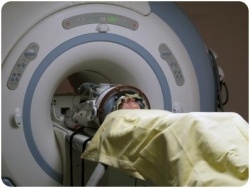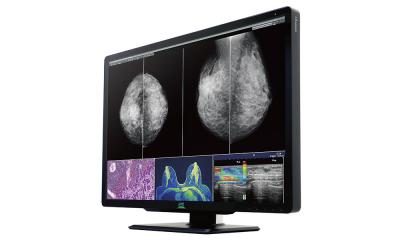Breakthrough in MR-guided, non-invasive neurosurgery
The Magnetic Resonance Center of the University Children's Hospital Zurich has achieved a world first breakthrough in MR-guided, non-invasive neurosurgery. Ten patients have been successfully treated by means of transcranial high-intensity focused ultrasound. This fully non-invasive procedure opens new horizons for neurosurgery and the treatment of different neurological brain disorders.

In the context of a clinical study at the MR Center of the University Children's Hospital Zurich transcranial MR-guided high-intensity focused ultrasound (HIFU) for brain surgery has been successfully applied for the first time world-wide. A research team under the direction of Professor Daniel Jeanmonod, neurosurgeon at the Department of Functional Neurosurgery of the Neurosurgical Clinic at the University Hospital Zurich and Professor Ernst Martin, director of the Magnetic Resonance Center at the University Children's Hospital Zurich succeeded in proving the safety and efficacy of this revolutionary surgical method which permits fully non-invasive brain interventions even on an out-patient basis.
For quite some years, HIFU has been used for the treatment of uterine fibroids and tumors of the prostate gland. However, its application to the brain through the intact skull for non-invasive neurosurgery was not possible until recently, because of insurmountable technical difficulties.
Non-invasive neurosurgery
In a Swiss National research project, the team of the University of Zurich successfully implemented and optimized a prototype system for transcranial Magnetic Resonance-guided High-Intensity Focused Ultrasound (HIFU) for neurosurgical interventions. The HIFU system ExAblate® 4000, developed by the cooperation partner InSightec, Tirat Carmel Israel, has been combined with a 3 Tesla high field GE MR-scanner. The two systems together provide a platform for image-guided, non-invasive interventions. Since September 2008 ten patients were treated at the Children's Hospital Zurich with this new neurosurgical procedure in the context of a clinical study. All interventions were completed successfully and without complications. This novel technology now opens up new horizons allowing to develop non-invasive intervention procedures for a variety of brain diseases including brain tumors.
The whole surgical procedure is planned and monitored in real time by magnetic resonance imaging (MRI). The HIFU beams produced by 1024 transducers are transferred through the intact skull of the patient into the brain and concentrated onto a focus of 3 to 4 millimeters in diameter. Thus, sharply defined targets deep inside the brain are coagulated by heating them up to a focal temperature of 60 degrees Celsius. The temperature increase during the sequential „sonications", each lasting 10 to 20 seconds, is continuously displayed and controlled on precise MR-temperature distribution maps. The whole surgical procedure lasts several hours and is performed without anaesthesia. Patients are awake and fully conscious during the intervention.
A project of the National Centre of Competence in Research (NCCR) Co-Me
In the context of the Swiss National Research Program NCCR Co-Me (computer aided and image guided medical interventions), the potential of non-invasive, transcranial MR-guided high-intensity focused ultrasound (tcMRgHIFU) is investigated in clinical studies at the University Children's Hospital Zurich. Scientists working in the Co-Me program pursue the goal of establishing and developing surgical interventions by means of tcMRgHIFU, in order to broaden the spectrum of completely non-invasive interventions for functional neurosurgery and for the treatment of brain tumors, stroke and various neurological brain disorders by targeted drug delivery.
The research project represents a co-operation between the University of Zurich and the ETH Zurich, through (A) the Magnetic Resonance Center of the University Children's Hospital (Professor Ernst Martin), (B) the Department of Functional Neurosurgery of the Neurosurgical Clinic at the University Hospital Zurich (Professor Daniel Jeanmonod), (C) the Medical Image Analysis and Computer Vision Laboratory of the ETH Zurich (Professor Gabor Székely) and (D) the Institute of Neuroinformatics, ETH Zurich (PD Dr. Daniel Kiper), as well as the industrial partner InSightec Ltd.
29.06.2009





